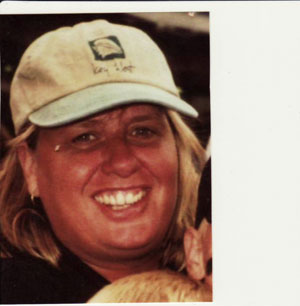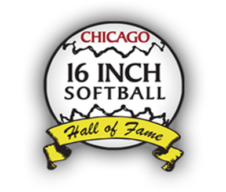Julie Iverson’s foray into softball was never about being the “star.” It was always about what she could do to help the team win. If it meant hitting a ground ball to the right side of the infield to score a run, that’s what she did; if it meant getting on base to start a rally, that was her goal; if it meant make a diving stop at third to throw out a runner at first, that was her focus. She was and still is all about team. Julie attributes her team mentality to coming from a family of eleven where learning to work together came early in life. Julie grew up on the South side of Chicago at 80th and Saginaw in the 1960s. Those were the last of the glory days, when kids could hang out without the worry of being attacked by gangs or catching a stray bullet. In fact, the only thing the kids on Saginaw wanted to catch was a football, softball or basketball, depending on the season. Julie was the only “girl” on the block that was allowed (or desired) to play ball with the boys. In fact she was usually the first one picked after the captains were chosen and the baseball bat was capped. When Julie was twelve years old, she played Little League baseball at Eckersall Park at 83rd and Yates until an opposing coach, after looking at the stat book, had Julie kicked out of the playoffs because she was female. She recalls walking home carrying her mitt and spikes, crying and mad as hell because she fell victim to the politics of the game. Julie’s first real experience into organized sports came in high school at Aquinas Dominican located on 72nd and Clyde. She played on some of the most memorable basketball and volleyball teams at Aquinas. The camaraderie between players is what she fondly remembers the most. To this day when Julie runs into a former teammate, they still call each other by their numbers, Julie was #22. She made the AAU (precursor to IHSA) All-Star team her junior and senior years. She won “Athlete of the Year” all four years at Aquinas, the first time ever accomplished in school history. Julie’s sports career continued throughout college at Chicago State University. Luckily, she was awarded an athletic scholarship, an honor that came in handy in a family of thirteen because her parents could not afford the tuition and without the full ride there would have been no college. She played volleyball, basketball, and her favorite sport, softball at Chicago State. During the summers Julie began to play on a softball team in the bar leagues at both Monroe and Kennedy Parks. This team included Julie’s Aquinas High School coach and some of the other teachers who just happened to be nuns. One teammate was the principal. This softball team was sponsored by Harrigan’s bar. Eventually they morphed into a team called the Hookers. Of course, you had to be 21 years old to play in the league, but once the owner saw Julie hit a ball she was able to obtain a fake ID and for the next two seasons she was known as Papena Prange. Julie’s divine team managed to win five championships between the two leagues. At Chicago State University she met her best friend for life, Pat McGuire, along with Bob Eskew, Mary Ann Walters, Cathy Cunningham and Pam Michalski soon to be the core of Rose and Crown women’s softball team. The summer before Rose and Crown was formed, Julie played with a tournament team call McClory Pontiac. It was a decent team with some good players but they could never beat the experienced teams like Rays out of Calumet City or the Pets from Blue Island. Rose and Crown was the team that went on to dominate for years to come. Being part of the creation and development of Rose and Crown, Julie feels was one of the most inspirational ventures she was ever involved in. Forming a team of experienced and youthful players was awesome. From the moment they hit the field for the first practice, they all knew they were a part of something special. The first season for Rose and Crown surprised everyone but themselves. The team won league titles at Blue Island, Cal Park and Cal City. Their tournament victories were even more impressive in that they beat not only the South side teams but were competing favorably against the North side teams and teams from the suburbs. Rose and Crown was so successful that there was rule put in place at Mt. Greenwood Park that allowed only two Rose and Crown players to a team. For the next four seasons, Julie played softball for the best team ever. Rose and Crown compiled record 246 wins and 29 losses. It should be mentioned that Julie is left-handed and was the only left-handed third baseman playing at this level. She did not know left-handers weren’t “supposed” to play third base until she overheard an opposing coach say to his team to “hit it to third, lefthanders can’t play third”; it only took the first couple of batters to prove him wrong. Julie wanted all batters to hit to her because that’s how she played the game. Julie left Rose and Crown in 1981 and moved to Huntington Beach, California. There she joined Nusuth, an USSSA 11-inch team, and played softball year round, winning tournaments in Modesto, Las Vegas, Santa Barbara, and San Diego. Nusuth qualified for Nationals two years in a row but failed to place higher than eighth. While in California, Julie suffered as serious knee injury that ended her softball playing career. She returned to Chicago to undergo a series of knee surgeries but was never able to return to the kind of caliber of softball she was accustomed to playing. So, Julie decided to help out anyway she could so she switched to coaching. By now many competitive teams in Chicago had turned to 11-inch and were playing in tournaments throughout the Midwest. One of Rose and Crown’s archrivals was the Angels who were coached by Bill Brokal. Bill noticed Julie in the stands and asked her to help out coach the Angels. Julie recruited some Rose and Crown players and as the team was preparing for a new season tragedy struck when Bill died suddenly. The team was understandably in shock but knew that Bill would want them to carry on. The team asked to Julie to lead them; she did not hesitate and said yes. The Angels dedicated that season to the memory of Bill and played outstanding. They qualified for the national tournament held in Jacksonville Florida where they finished third out of sixty-seven teams. It was year filled with great memories and many lifelong friendships were made. Julie’s coaching days ended with Smooth Over, a 16-inch softball team. For five years, Smooth Over won the league championship at Kennedy Park. Three of those seasons they never lost a game. In addition, they won three Y- Me tournaments. Julie’s life philosophy has always been to bring people together to create a winning team. She strives to bring out the best in people. Whether it was playing for Harrigans, the Hookers, Pot Belly’s, Rose and Crown, or coaching the Angels or Smooth Over, for her it was all about working together and being part of a team in which the end result was winning. The only trophy that meant anything to Julie Iverson was the team trophy. It is an honor to be inducted into the Chicago 16-inch Softball Hall of Fame. I applaud your dedication to this great sport of ours that meant so much to so many. Thank you, softball!

